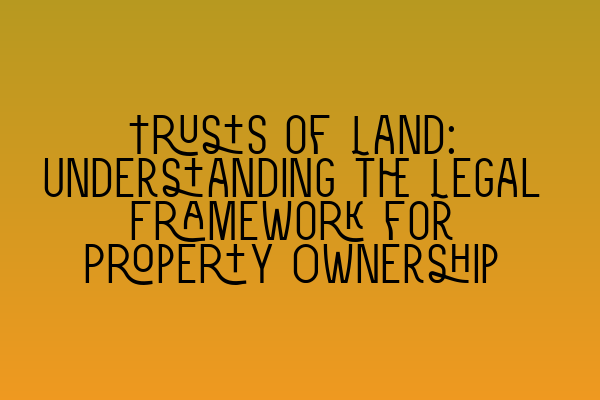Trusts of Land: Understanding the Legal Framework for Property Ownership
When it comes to property ownership, understanding the legal framework is crucial. One area of property law that often comes into play is trusts of land. Trusts of land are a legal arrangement where a property is held by one or more individuals on behalf of another party.
In this article, we’ll delve into the world of trusts of land and explore the legal intricacies involved. Whether you’re a homeowner, a potential property investor, or a legal professional, the knowledge presented here will provide you with a comprehensive understanding of the topic.
What is a Trust of Land?
A trust of land is a legal arrangement where one or more individuals (known as trustees) hold legal title to a property on behalf of another party (known as beneficiaries). This arrangement ensures that the property is managed, maintained, and used in accordance with the wishes and best interests of the beneficiaries.
A trust of land can be established through various means, including a written trust deed, a will, or by operation of law. It is important to note that trusts of land can apply to both residential and commercial properties, making the concept relevant for a wide range of property owners and investors.
Under a trust of land, the legal ownership of the property is vested in the trustees, while the equitable ownership (beneficial interest) is held by the beneficiaries. This dual ownership structure is a fundamental aspect of trusts of land and sets them apart from other forms of property ownership.
The Legal Framework for Trusts of Land
Trusts of land in the United Kingdom are primarily governed by the Trusts of Land and Appointment of Trustees Act 1996 (TOLATA). This legislation provides a comprehensive framework for the creation, administration, and termination of trusts of land.
TOLATA sets out various rights and duties of trustees and beneficiaries, including the trustees’ power to manage the property, make decisions related to its use and occupation, and even sell or lease the property if necessary. It also establishes the beneficiaries’ rights to occupy, receive income from, and ultimately benefit from the property.
In addition to the statutory framework provided by TOLATA, the law surrounding trusts of land is influenced by a wealth of case law and judicial decisions. Analyzing landmark cases and understanding the reasoning behind influential judicial decisions can provide valuable insights into the application and interpretation of trust law.
If you’d like to explore this topic further, our article on SQE Contract Law: Analyzing Landmark Cases and Influential Judicial Decisions delves into some of the most important cases and decisions that have shaped the legal landscape in this area.
The Importance of Understanding Trusts of Land
Having a solid understanding of trusts of land is essential for various parties involved in property ownership. For homeowners, understanding the legal framework for trusts of land can shed light on the rights and obligations of trustees and beneficiaries, ensuring that their interests are protected and their wishes are properly implemented.
For potential property investors, knowledge of trusts of land can open up opportunities for joint ventures, where multiple parties come together as co-owners to invest in a property. Understanding the legal implications of this arrangement and the rights and responsibilities of co-owners is vital for making informed investment decisions.
Legal professionals specializing in property law must be well-versed in trusts of land to effectively advise clients and handle matters related to property ownership. Whether it’s drafting trust deeds, navigating disputes between co-owners, or guiding clients through the process of amending or terminating a trust, a deep understanding of trusts of land is crucial.
Enhance Your Knowledge of Property Law
To expand your understanding of trusts of land and other important aspects of property law, our team at SQE Property Law & Land Law offers a range of resources and services.
If you’re looking to improve your overall knowledge of property law, our article on Understanding Contractual Capacity: Rights and Limitations provides valuable insights into the legal requirements and limitations of contractual agreements in property transactions.
If you’re preparing for the SQE assessments and want to test your knowledge of property law, our Interactive SQE Mock Tests for Contract Law: Test Your Knowledge offer a practical and interactive way to gauge your understanding and identify areas for improvement.
For a more in-depth exploration of property law and guidance from industry experts, consider joining our SQE Contract Law Webinars: Expert Insights and Guidance. These webinars provide an opportunity to engage with professionals in the field and gain valuable insights to enhance your legal knowledge.
Finally, if you’re looking for comprehensive preparation resources for the SQE assessments, our SQE Prep: Mastering the Essentials of Contract Law materials are designed to help you build a solid foundation in property law and other key areas of contract law.
Conclusion
Trusts of land play a significant role in property ownership, allowing for effective management, shared ownership, and protection of beneficiaries’ interests. Whether you’re a property owner, investor, or legal professional, it is crucial to have a comprehensive understanding of trusts of land and the legal framework surrounding them.
By familiarizing yourself with the key concepts and requirements of trusts of land and utilizing the resources provided by SQE Property Law & Land Law, you can enhance your knowledge and navigate the complexities of property ownership with confidence.
